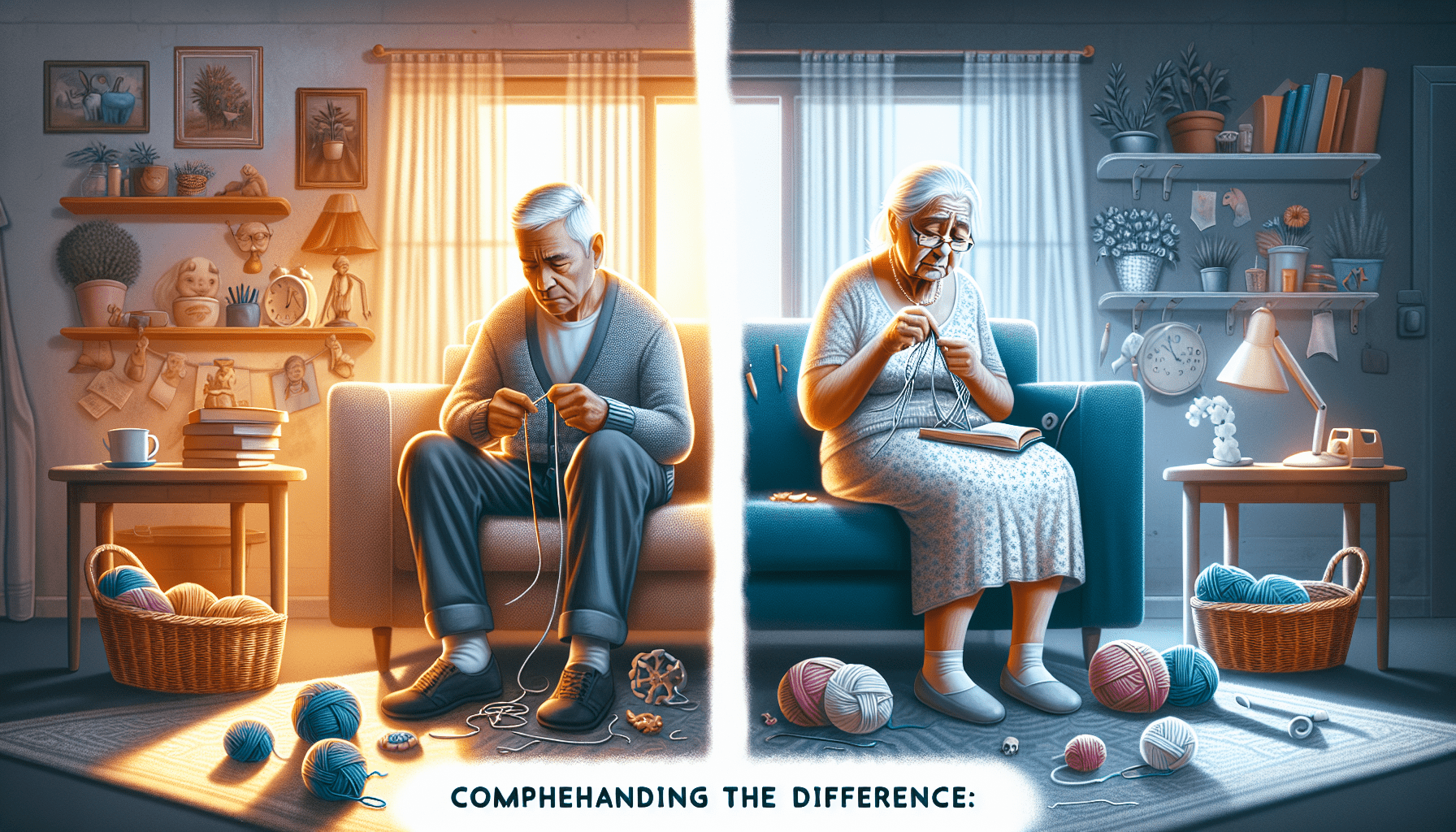Do you ever find yourself wondering whether your occasional forgetfulness is just a natural part of growing older or something more concerning? It's a common question, and the distinction between age-related memory loss and dementia is crucial for peace of mind and effective management. This article aims to arm you with the knowledge to differentiate between the two conditions, providing you with clarity and understanding.
The Nature of Memory Loss
Memory loss can be unsettling, but it's important to recognize that not all forgetfulness is the same. As you age, some degree of memory loss is normal. Think about it like a computer's hard drive; over time and with more use, it can slow down, but it still works. The same applies to your brain.
The Basics of Age-Related Memory Loss
Age-related memory loss is often benign and doesn't interfere significantly with your daily life. You might occasionally forget where you placed your keys or have difficulty recalling someone’s name. These lapses are typical and usually aren't indicative of a more serious problem.
Characteristics:
| Feature | Description |
|---|---|
| Frequency | Occasional forgetfulness. |
| Severity | Mild and usually not disruptive. |
| Common Examples | Misplacing items, forgetting names, or missing appointments. |
| Progression | Usually doesn’t worsen significantly over time. |
Characteristics of Dementia
Dementia, on the other hand, is a different beast entirely. It's not a single disease but a term that encompasses various conditions, including Alzheimer's disease. Dementia is characterized by a significant decline in cognitive functions, such as memory, language, and problem-solving skills. Unlike age-related memory loss, dementia can severely disrupt your daily life.
Characteristics:
| Feature | Description |
|---|---|
| Frequency | Frequent forgetfulness. |
| Severity | Severe and affects daily activities. |
| Common Examples | Inability to remember recent events, getting lost in familiar places, difficulty performing familiar tasks. |
| Progression | Gradually worsens over time. |
Symptoms: Age-Related Memory Loss vs. Dementia
Understanding the symptoms helps you distinguish between normal aging and more serious conditions. Here’s a deeper dive into the symptoms associated with both age-related memory loss and dementia.
Symptoms of Age-Related Memory Loss
Memory loss that comes with age usually includes:
- Occasional Forgetfulness: Misplacing items or forgetting appointments from time to time.
- Slow Information Recall: You might need a moment to remember names or details, but you can recall them eventually.
- Retaining Functions: You can still perform everyday tasks without major issues.
Symptoms of Dementia
Dementia presents a more pronounced and intrusive set of symptoms:
- Frequent Memory Lapses: Regularly forgetting recent memories, dates, or events.
- Confusion: Becoming disoriented in familiar settings or about time and day.
- Impacts on Daily Life: Difficulty completing everyday tasks, such as cooking or managing finances.
- Language Problems: Challenges in finding the right words or following conversations.
- Behavioral Changes: Noticeable shifts in personality or behavior, such as increased agitation or withdrawal.

Diagnosing Age-Related Memory Loss and Dementia
Proper diagnosis is key in distinguishing between age-related memory loss and dementia. Here’s how healthcare professionals approach it.
Diagnosing Age-Related Memory Loss
Diagnosis typically involves:
- Medical History: Your doctor will review your medical history to identify any factors that could contribute to memory loss.
- Physical Examination: A basic assessment of your physical health to rule out other causes.
- Cognitive Tests: Simple tests to evaluate your memory and cognitive functions.
- Observation Period: Monitoring over time to see if the symptoms worsen or remain stable.
Diagnosing Dementia
Diagnosing dementia is more complex and may involve a series of evaluations:
- Detailed Medical History: In-depth review of personal and family medical histories.
- Comprehensive Cognitive Tests: Advanced tests to assess memory, reasoning, language, and other cognitive functions.
- Neurological Examination: Detailed exam to evaluate neurological health.
- Brain Imaging: MRI or CT scans to check for abnormalities in the brain.
- Blood Tests: To rule out other potential causes of symptoms, such as thyroid issues or vitamin deficiencies.
Risk Factors
Several risk factors can influence whether you experience age-related memory loss or develop dementia. Understanding these can help you take proactive steps toward better brain health.
Risk Factors for Age-Related Memory Loss
While some factors are unavoidable, lifestyle can play a significant role in how your memory ages.
- Age: Simply growing older is the most significant risk factor.
- Genetics: Family history can contribute to age-related memory loss.
- Lifestyle: Poor diet, inactivity, and not engaging in mentally stimulating activities can exacerbate memory loss.
Risk Factors for Dementia
Dementia has more complex and varied risk factors:
- Age: Risk significantly increases as you get older, especially after age 65.
- Genetics: Family history and specific genetic markers can raise your risk.
- Health Conditions: Hypertension, diabetes, and cardiovascular diseases are linked to higher dementia risks.
- Lifestyle Choices: Poor diet, lack of exercise, smoking, and excessive alcohol consumption can contribute to dementia.

Prevention Strategies
While you can't stop aging, certain lifestyle changes can reduce the risk of memory loss and dementia. Here are some tips to help keep your mind sharp.
Prevention of Age-Related Memory Loss
Small changes can make a big difference.
- Healthy Diet: Focus on a balanced diet rich in fruits, vegetables, lean proteins, and whole grains.
- Regular Exercise: Physical activity boosts blood flow to the brain, helping maintain cognitive health.
- Mental Stimulation: Engage in activities like puzzles, reading, or learning new skills to challenge your brain.
- Social Interaction: Staying socially active helps keep your mind engaged and reduces stress.
Prevention of Dementia
Preventing dementia involves a more comprehensive approach, aiming to manage both lifestyle and health conditions.
- Control Health Conditions: Keep conditions like hypertension, diabetes, and high cholesterol in check.
- Regular Exercise: Maintain a routine that includes both aerobic and strength-training exercises.
- Balanced Diet: The Mediterranean diet, rich in healthy fats, fish, and plant-based foods, is linked to lower dementia risk.
- Mental and Social Activities: Engage in mentally challenging activities and maintain strong social connections.
- Avoid Smoking and Excessive Alcohol: Both are known to increase the risk of cognitive decline.
Treatment Options
When it comes to treating age-related memory loss and dementia, the approaches differ.
Treating Age-Related Memory Loss
Treatment mainly focuses on lifestyle adjustments.
- Diet and Nutrition: Ensuring a balanced intake of nutrients that support brain health.
- Physical Activity: Regular exercise to improve overall health and cognitive function.
- Cognitive Activities: Engaging in brain games, learning new skills, and maintaining social connections.
Treating Dementia
Dementia treatment requires a multifaceted approach due to its complexity.
- Medications: Certain drugs can help manage symptoms or slow the progression of dementia.
- Therapies: Cognitive-behavioral therapy and occupational therapy can assist in coping with the decline.
- Support Systems: Family and caregiver support are crucial for managing daily activities and ensuring a good quality of life.
- Lifestyle Changes: The same healthy lifestyle choices that prevent dementia can also help manage its progression.
When to Seek Help
Knowing when to consult a healthcare professional can make all the difference in managing either condition effectively.
Signs It's Age-Related Memory Loss
You might need medical advice if:
- Frequent Forgetfulness: Even mild forgetfulness becomes frequent or starts affecting daily life.
- Anxiety About Memory: Concern about your memory is causing stress or anxiety.
- Comorbid Conditions: History of stroke, heart disease, or diabetes, which could impact memory.
Signs It's Dementia
Seek professional help if you experience:
- Significant Memory Lapses: Forgetting recent events or repetitive questioning.
- Disorientation: Getting lost in familiar places or confusion about time.
- Inability to Handle Daily Tasks: Difficulty performing simple and familiar tasks.
- Behavioral Changes: Noticeable shifts in mood or personality, such as depression or increased irritability.
Living with Memory Loss or Dementia
Living with memory loss or dementia can be challenging, but with the right strategies, you can still maintain a fulfilling life.
Coping with Age-Related Memory Loss
- Stay Organized: Use planners, calendars, or apps to keep track of tasks and appointments.
- Create Routines: Establishing routines can help reduce forgetfulness.
- Stay Engaged: Keep socially and mentally active with hobbies, volunteering, or other activities.
Coping with Dementia
- Professional Support: Work closely with doctors, therapists, and support groups for tailored care plans.
- Safety Measures: Implement safety modifications at home to prevent accidents.
- Daily Structure: Maintain predictable routines to reduce confusion and anxiety.
- Caregiver Support: Whether through family or professional caregivers, support is essential for well-being.
Conclusion
Differentiating between age-related memory loss and dementia is crucial for your peace of mind and effective management. By understanding the symptoms, getting a proper diagnosis, and adopting proactive strategies, you can take control of your cognitive health.
If you have concerns about your cognitive function, don't hesitate to consult a healthcare professional. Early intervention can lead to better outcomes, whether it's managing normal age-related changes or addressing more serious conditions like dementia. Armed with this knowledge, you're better prepared to navigate the complexities of memory loss and continue living a vibrant, fulfilling life.
